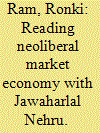| Srl | Item |
| 1 |
ID:
136468


|
|
|
|
|
| Summary/Abstract |
This article critically explores the implications of the recent turn to transnational efforts in activism that seeks to counter caste-based discrimination. In particular, it analyses the consequences of mobilising a concept of caste that is sufficiently expansive to accommodate occupation- and descent-based discrimination globally, and which primarily frames caste in terms of human rights. To what extent is it possible to maintain a nuanced conceptualising of caste and of what it means to occupy the margins of the caste system, if efforts to influence the workings of global governance institutions divest caste of its regional and local distinctiveness? The article demonstrates how, even though Dalit (‘untouchable’) activists have been successful in bringing attention to caste as a global concern, present endeavours, on the one hand, reinforce the marginalised identity that they seek to overcome and, on the other, fail to recognise the diversity and situated-ness of the Dalit experience.
|
|
|
|
|
|
|
|
|
|
|
|
|
|
|
|
| 2 |
ID:
134266


|
|
|
|
|
| Summary/Abstract |
This paper studies photographs of Bombay's built environment, especially Dalit and working-class houses, taken by two social scientists in the 1920s and 1930s. The photographs are situated at the intersection of four discursive temporalities: (a) social reforms initiated by Indian nationalists of the late nineteenth to twentieth centuries; (b) sanitary reforms and urban restructuring undertaken by city administrators and the colonial state, which reappeared vigorously after the plague epidemic of 1896; (c) colonial knowledge production, including census, labour and housing reports that informed academic social–scientific knowledge; and (d) Dalit and working-class social movements that aspired to transgressing the limits of reform in order to re-define self and the collective, and demand the redistribution of material resources.
|
|
|
|
|
|
|
|
|
|
|
|
|
|
|
|
| 3 |
ID:
135144


|
|
|
|
|
| Summary/Abstract |
This article intends to explore how neoliberal market economy impacts social democracy in globalising India and examines its implications for the millions of Dalits. It argues that the institution of social democracy, which flourished in India during the Nehruvian era of mixed economy and welfare state, seems to be fast approaching its demise under the ongoing process of neoliberalism. It further argues that the fast-expanding domain of the corporate sector and the free flow of global capital, in conjunction with the gradual withdrawal of the welfare state, will not only widen inequalities, but also stifle the growth of social democracy in the country.
|
|
|
|
|
|
|
|
|
|
|
|
|
|
|
|